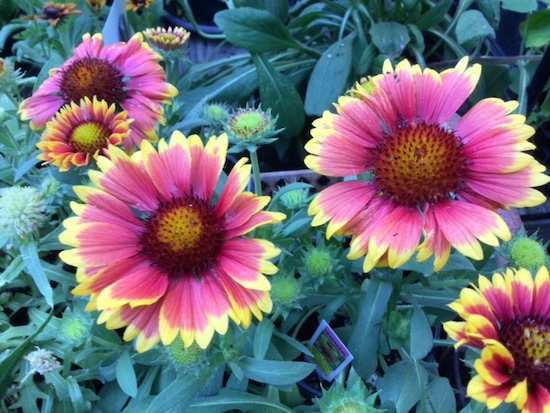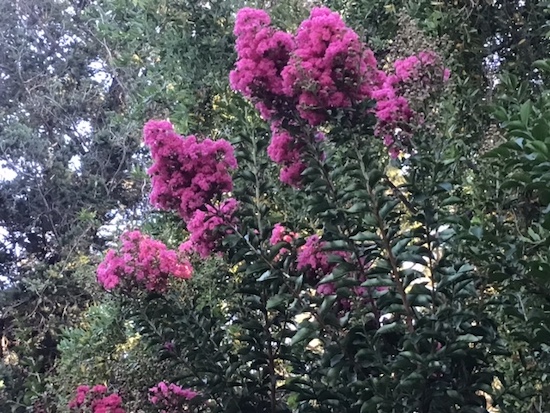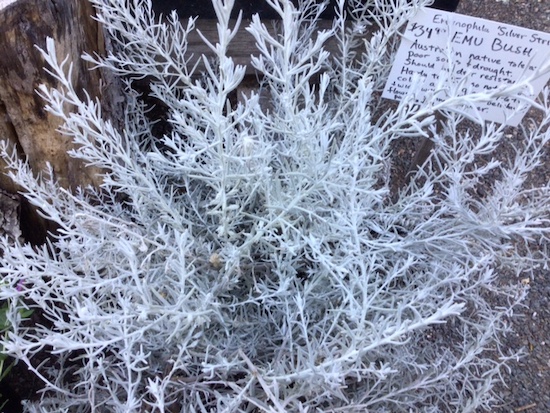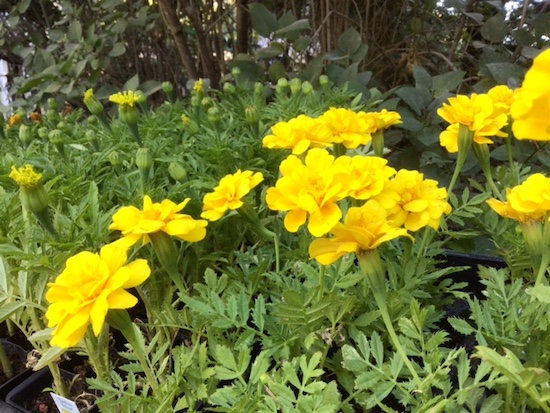
July is here, and if you have been reading the newsletters over the years, you will remember that this is the month with the highest evapo-transpiration rate for plants. Not only is the evaporation rate from the soil high, but the transpiration rate is, too. What is transpiration? That is moisture loss through the leaves. You can liken it to human sweat. If your irrigation schedule is still in spring mode, you might want to consider upping your run times. Remember that deeper, longer watering is better than more frequent short run times. Deep watering helps the roots to go deeper, thus making your plants more tolerant of heat and drought. Drip emitter run times need to be more than 10-15 minutes, which is fine for spray-type lawn sprinklers. Rainbird types need to run longer. I find more like 20-30 minutes. I set my drip lines for 45 minutes to an hour. Trees need less frequent run days but longer run times, like at least two hours. Most trees that have a diameter of several inches can go through the summer without irrigation, but a deep soak once a month would help. This is very broad and general information. Hand watering, except for pots, is not recommended as you will find you are only wetting the soil down 2 inches deep, if that.
We have been blessed the past couple of years with no major fires, but it looks like our luck will change this year. Here is a reminder that the first 5 feet around the house are the most critical. Unfortunately, for moisture conservation and looks, most mulches, except for gravel and stones, are flammable. So is the natural leaf litter that I leave on the ground, often very close to the house. I do not have gutters, but my flat roofs get debris on them, too. I also have a few trees that have branches either touching the roof or close to it. All these things give my house a poor rating as far as being ‘fire safe’ if there is such a thing for an old house made of wood.

I guess what I am getting at is do as I say, not as I do. I find I often don’t follow the newsletter suggestions for my own personal plants. My roses need feeding and deadheading after their first bloom. Jahi has been doing that to the roses for sale at the nursery and they have been fed with our wonderful EBStone Rose and Flower food. If you have not done that, both you and I should. It is also time to feed my vegetable garden with EBStone Tom/Veg, All Purpose, or Fish Emulsion. An added benefit to using fish emulsion regularly is that it will help deter gophers. You can even pour it in their holes as a repellent. Our EBStone fish has Kelp added, a natural rooting hormone. So here is a shout-out to our good old-fashioned basic multi-use Fish Emulsion with Kelp.
Summer means hanging out on your patio or deck into the evenings and at times, past dark. We have some nice wooden furniture in stock right now, along with solar lights. It also means mentioning the ‘moon garden’ plants in stock now. Moon garden plants have white flowers, evening fragrances, or silver foliage. Summer white flowering shrubs include roses, oleander, butterfly bush, crepe myrtle, and hydrangeas. Flowering perennials and annuals include white varieties of alyssum, gaura, verbena, calibrochoas, petunias, shasta daisies, and lantana. Silver or grey foliage plants or varieties include emu bush, shrub teucrium, senecio, artemisia, buddleja, lavender, and petite licorice. These plants will add a nighttime dimension to your garden.

Thanks to our wet winter with no temps into the low twenties or high teens, the bugs are plentiful this year. I know I have mentioned this in the past newsletters, but I thought it was worth talking about plants that repel some of these pests again. Borage for tomato hornworm. Basil for whiteflies and aphids. Lavender, rosemary, mint, lemon-scented plants, catnip, garlic, and geranium for mosquitoes. Chamomile, basil, geraniums, and rosemary for flies. Mint can repel mice, and I have heard even raccoons. Chives repel aphids. Marigolds keep nematodes, whiteflies, and aphids away. Not only is it good to have pots of geraniums by your door to repel flies and mosquitos from getting in the house, but mix some of these bug deterrents in your vegetable garden. Here at the nursery, we rely on ladybugs, sticky traps, and Sluggo Plus for most of our pest issues.
Our seed supplier, Renees Garden, is closed until July 15th to do inventory. They will reopen with 2025 seeds (yikes), so we will restock them for fall. What we have in stock is what we can get for now. They are also moving their warehouse and plan to be closed all of September. This might cause a few problems as far as our seed racks go, so bear with us. Our 2025 bare root orders have been placed already, and we are only halfway through 2024. It is always a bit of a gamble, but we will definitely get less next year.

The price of Pink Princess and White Princess Philodendrons are starting to come down, and we have a few 4-inch pots for 26.99. Same price for the Golden Lion. Thai Constellation is still mighty pricey, and I refuse to bite, but if anyone wants one, a plant is still going to cost over $50. Crazy to think about if you are as bad with houseplants as I am. In my defense, I did read that a houseplant, even under the best of circumstances, has an average ‘looking good’ life span of 6 years.
By the time you read this, I will have put down my faithful dog Tor. He will be missed.

July Specials
50% Off
- All ‘summer’ veg in 6 packs and 4 inch
- Summer bulbs
20% Off
- Deciduous fruit trees and vines
- Peonies…Roses
- Daylilies…Herbs…Marigolds
- Glazed Pots
